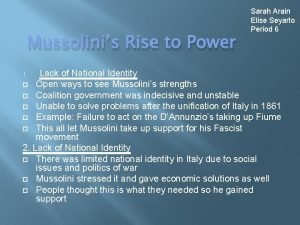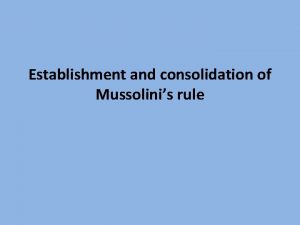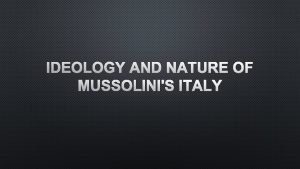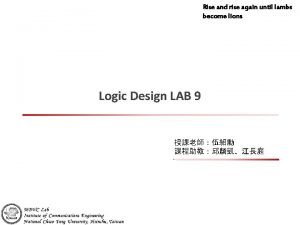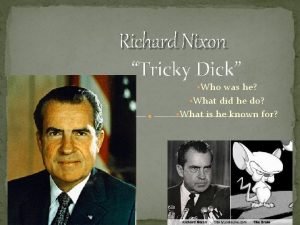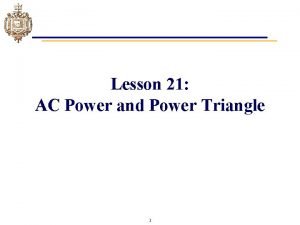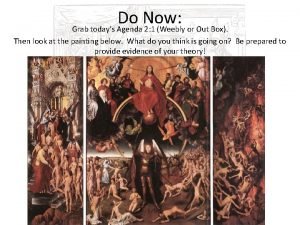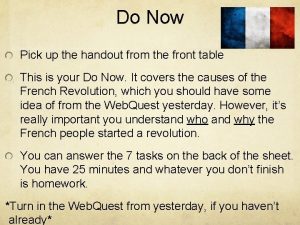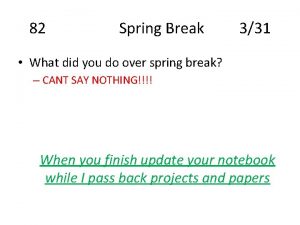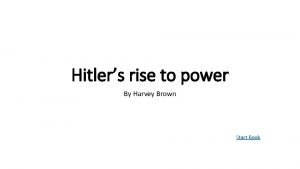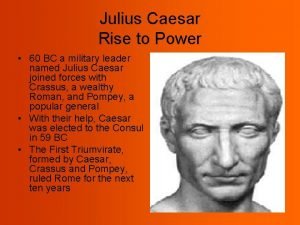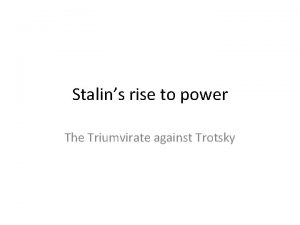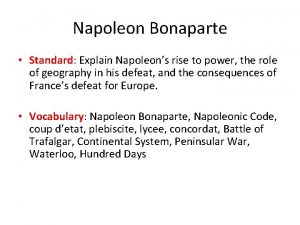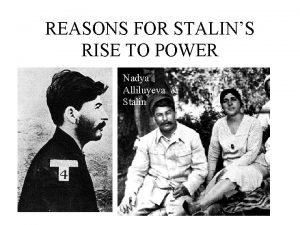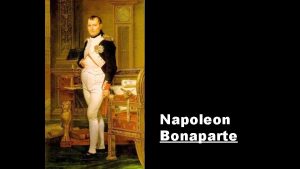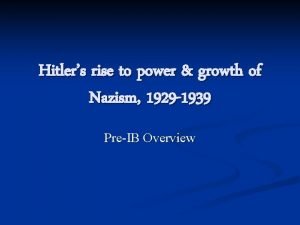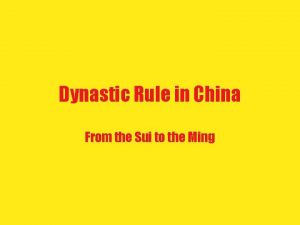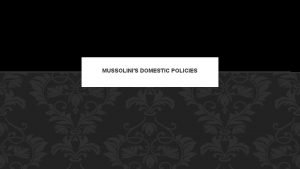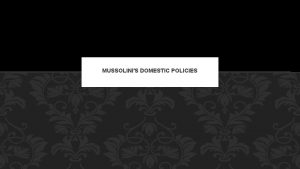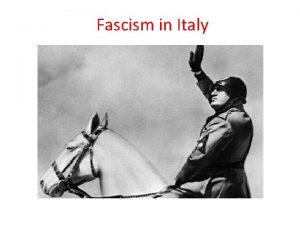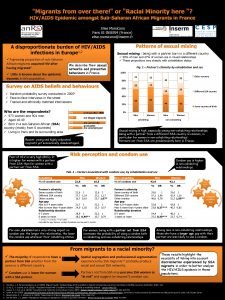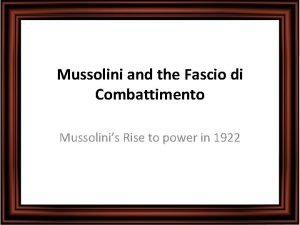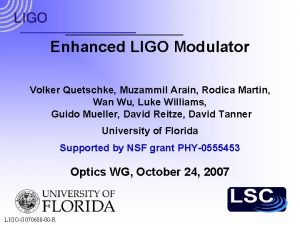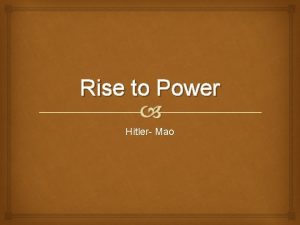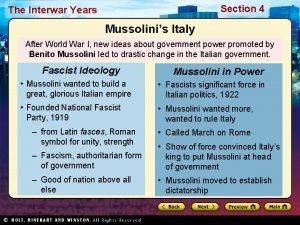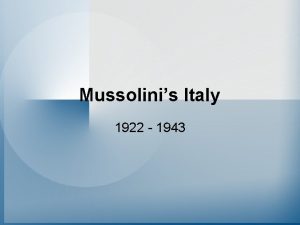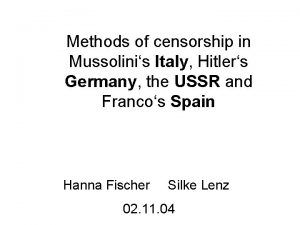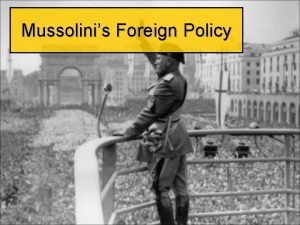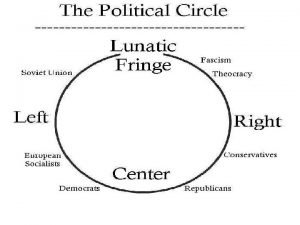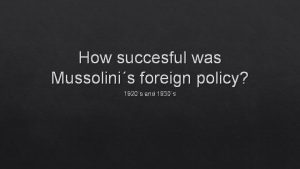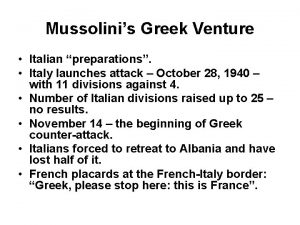Mussolinis Rise to Power Sarah Arain Elise Seyarto






















- Slides: 22

Mussolini’s Rise to Power Sarah Arain Elise Seyarto Period 6 Lack of National Identity Open ways to see Mussolini’s strengths Coalition government was indecisive and unstable Unable to solve problems after the unification of Italy in 1861 Example: Failure to act on the D’Annunzio’s taking up Fiume This all let Mussolini take up support for his Fascist movement 2. Lack of National Identity There was limited national identity in Italy due to social issues and politics of war Mussolini stressed it and gave economic solutions as well People thought this is what they needed so he gained support 1.

3. Catholic Church Chose to work with the church to keep the public’s loyalties He did things such as baptize his children and religious ceremonies to please the church and people He closed wine shops and night clubs and swearing became a crime He and the church clashed over who should control education (Lateran Treaties) http: //www. academia. edu/8177897/How_did_Mussolini_become_ Prime_Minister_of_Italy_in http: //www. markedbyteachers. com/as-and-alevel/history/mussolini. html http: //www. historylearningsite. co. uk/modern-world-history-1918 -to 1980/italy-1900 -to-1939/mussolini-and-the-roman-catholic-church/

Mussolini’s Rise To Power 1921 -Mussolini’s fascist party grew to around 250, 000 Giovanni Giolitti invited the fascist party into parliament Giolitti became a more unpopular prime minister, people began to withdraw support and Mussolini became a picture of strength 1922 -“March on Rome”-fascist were ready to unleash a civil war October-In response to this King Victor made Mussolini the leader of parliament PSI(Socialist party) and PPI[Popular party(Catholic political party) were ignored in parliament PSI and PPI didn’t support Mussolini and protested To gain their support, Mussolini assured industrialist control over their own industries and dropped the investigation into profits made by industrialist during WWI, promised workers eight hour days and more of their money went to their families and not the government and reintroduced religious education in Italian schools.

Mussolini’s Rise to Power -The nationalist opposition -Marinetti was an artist that led an art movement known as the futurist movement and overtime this grew into more of a political party. -Futurist art had elements of speed and violence particularly war -Marinetti’s movement sought to ally with Mussolini and fascism, however Marinetti was adamantly against Hitler as Hitler despised futurist art. -Marinetti eventually became Mussolini’s ally sacrificing a few of his ideals of futurism in order to establish it as a global movement, but their views often contrasted. Mussolini was not a fan of art and preferred it to remain out of politics, denying Marinetti’s requests to make futurism the state art. -Mussolini found great use out of Marinetti’s Futurist party, using its success to help him succeed, as Marinetti was a speech writer for Mussolini, and Marinetti was already an established writer and poet, he wrote the Futurist Manifesto. -Futurists did not receive the same benefits and it caused futurism to divide in 1920 those who remained somewhat loyal to fascists and those who weren’t and Marinetti was still strangely considered the center of both of them as he was the face of futurism. Tanoa Fedler Works Cited: muse. jhu. edu; Wikipedia; marxist. com

Elsa Trivison P 4 IMPACT OF WORLD WAR I Italy’s reasons for joining the Treaty of London: • Entered the side of the allies in 1915 • Promise of territory from the Bristish • Italy is not “bound” in the alliance with Germany and Austro. Hungaria • Wanted territory in Austria which they could not have if they had a treaty • The German and Austro-Hungarian alliance only promised the possibility of giving them parts of the Trentino and Eastern Friuli without Gorizia and Trieste. https: //en. wikipedia. org/wiki/Military_history_of_Italy_during_W orld_War_I http: //www. bbc. co. uk/schools/worldwarone/hq/causes 1_01. shtm

Impact of World War 1 on Italy • 680, 000 Italians died during WW 1 http: //www. english. emory. edu/Lost. Poets/Casualties. html • Even though they were among the allies, Italy did not gain any territory, which was disappointing due to their military sacrifice http: //www. english. illinois. edu/maps/ww 1/bournee ssay. htm • After the war, Italy had a budget deficit of billions of lira https: //en. wikipedia. org/wiki/Economy_of_Italy

What is Fascism? Jessica Gettle p. 6 Fascism is essentially the merging of corporation and state. Fascism is state ownership. “Fascism conceives of the State as an absolute, in comparison with which all individuals or groups are relative, only to be conceived of in their relation to the State. ”- "Mussolini, "Doctrine of Fascism (1932)"" N. p. , n. d. Web. 20 Sept. 2015. “The Fascist State organizes the nation, but leaves a sufficient margin of liberty to the individual; the latter is deprived of all useless and possibly harmful freedom, but retains what is essential; the deciding power in this question cannot be the individual, but the State alone”"Internet History Sourcebooks. " Internet History Sourcebooks. N. p. , n. d. Web. 20 Sept. 2015. “For Fascism. . . the expansion of the nation is an essential manifestation of vitality, and its opposite a sign of decadence”- "Mussolini - THE DOCTRINE OF FASCISM. " Mussolini - THE DOCTRINE OF FASCISM. World Future Fund, n. d. Web. 20 Sept. 2015

Works Cited/Consulted "Internet History Sourcebooks. " Internet History Sourcebooks. N. p. , n. d. Web. 20 Sept. 2015. (http: //legacy. fordham. edu/halsall/mod/mussolini-fascism. asp) "Mussolini - THE DOCTRINE OF FASCISM. " Mussolini - THE DOCTRINE OF FASCISM. World Future Fund, n. d. Web. 20 Sept. 2015 (http: //www. worldfuturefund. org/wffmaster/Reading/Germany/mussolini. htm) "Mussolini, "Doctrine of Fascism (1932)"" N. p. , n. d. Web. 20 Sept. 2015. (http: //www. historyguide. org/europe/duce. html)

• It all began with Benito Mussolini speaking out against the Socialist party on its policy of neutrality during WWI-he was for participation with the Allies. • He was then kicked out of the Socialist party and which then joined the army, returned home wounded, and returned to run the paper. • Newspaper: used it to rally various groups such as war veterans, nationalists, and certain socialists that were wanted to remove democracy from Italy • In October 1922, the king instructed Mussolini to form a government(totalitarian dictatorship). Most people supported the new form of government and believed that fascism would be only a temporary part of government and Italy would return to freedom once conflict was resolved. • Once Mussolini had taken complete control of the government, any opposition was met with imprisonment, exlile, or execution. Why did support for fascism grow after WWI?

• http: //www. historians. org • https: //en. wikipedia. org/wiki/Italian_Fascism • http: //blogs. bu. edu Sources

IMPACT OF D’ANNUNZIO AND THE FIUME AFFAIR v Gabriele D’Annunzio - He was an Italian writer, poet, journalist, playwright, and soldier during World War I. - He was considered a national war hero after WW 1. v Fiume - D'Annunzio led a march to Fiume and captured it on September 1919. This action was wildly popular among the people at home, but it brought embarrassment to the Italian government. - He managed to hold on to Fiume until he was ejected in January 1921 by the Italian navy. v Impact - Italian Nationalists always wanted Fiume as a territory but the government disapproved. - When Mussolini rose to power, their styles collided and they became rivals in which D’Annunzio became less popular and wasn’t a major force in Italian affairs http: //www. firstworldwar. com/bio/dannunzio. htm https: //en. wikipedia. org/wiki/Gabriele_D'Annunzio http: //www. digitalhistory. uh. edu/era. cfm? eraid=12

Source(s): http: //www. historylearningsite. co. uk/modernworld-history-1918 -to-1980/italy-1900 -to-1939/italy-andworld-war-one/ 9. Economic Factors � Italy emerged from the war still a constitutional monarchy. And it emerged with inflation, a huge debt and unemployment aggravated by demobilization of thousands of soldiers. � The Italians did not get what they felt had been promised at the Treaty of London and that caused resentment especially at the losses Italy had endured fighting for the Allies. � Amid bitterness and disappointment was a widespread belief that the Old World was crumbling and that it was time to make a New World. � Every month in 1919, workers in Italy's industrial north went on strike. Tenants began refusing to pay rent, and the homes of a few landlords were destroyed. Many villages had someone who wished to be a new Marat or Lenin. And every month the Executive of the General Confederation of Labor announced in favor of the creation of a socialist republic and the dictatorship of the proletariat. � The government admitted its inability to maintain public order, and amnesties granted to striking workers confirmed the middle class in its belief that the parliamentary government was not only corrupt but weak. http: //www. shsu. edu/~his_ncp/Fas. Italy. html http: //www. fsmitha. com/h 2/ch 12 muss 2. htm • Some veterans were among those who joined the ranks of the Left, and some joined the ranks of the anarchists. Some others joined groups that pushed their status as combat veterans. • Mussolini drew allies from those veterans who called themselves the Arditi (from ardito, meaning brave). The Arditi were in many Italian towns and organized for violence against those they called traitors. • In June 1920, Nitti resigned. In August and September came a wave of strikes. A sit down strike in Milan spread to the city of Turin (100 kilometers to the west) and to factories in other cities.

March on Rome King Victor Emmanuel III never brought out the army to stop Mussolini’s forces so the fascists looked very strong to the people http: //www. britannica. com/event/March-on-Rome The nephew of the King, the Duke of Aosta, was a Fascist supporter and would have take over if Mussolini failed so power would have gone to fascists anyways http: //www. historylearningsite. co. uk/modern-worldhistory-1918 -to-1980/italy-1900 -to-1939/the-march-on-rome/ The Italian people needed to see power from Mussolini to prove Fascism’s worth and the March showed just that http: //www. shsu. edu/~his_ncp/Mar. Rom. html

How did Mussolini consolidate power? • While serving as Italy's youngest prime minister, Mussolini destroyed all political opposition by using his secret police Ø The secret police, known as the Organization for Vigilance and Repression of Anti-fascism (OVRA), was led by Arturo Bocchini and used for anything Mussoini viewed as a serious issue. • After destroying the political competition, Mussolini was able to pass a series of laws that legally established a one party dictatorial state. 1. Brbl-dl. library. yale. edu/vufind/Author? author=Mussolini%2 C+Benito%2 C+1883 -1945 2. www. historylearningsite. co. uk/modern-world-history-1918 -to-1980/Italy-1900 -to-1939/life-in -fascist-Italy/ 3. https: //en. m. Wikipedia. org/wiki/Organization_for_Vigilance_and_Repression_of_Anti. Fascism

HOW DID MUSSOLINI CONSOLIDATE POWER? Did he create a totalitarian state? Characteristics of a Totalitarian Government Mussolini in Italy • Totalitarian leaders ban any efforts to • All opposition were wiped out and oppose them disposed of, which left only the fascists to rule and compete for the country. • Force/ persuade the people to obey their ideology • Mussolini was a very good propagandist • Wanted the state to be based upon/rejuvenated to the days of the Roman Empire, which bought such prosperous and great times to Italy. • They control the media; use propaganda • Rely on scare tactics and violence • Radio, papers they read, had the views Mussolini wanted them to see. Mussolini would read every paper to check that there was no opinions within it that should not be there. • Yes, Complete the military • Had control over the military Musslini control createdover a totalitarian state in Italy. By Ariana

SOURCES http: //legacy. fordham. edu/halsall/mod/mussolini-fascism. asp http: //areallygoodread. com/Politics-and-Law/Mousollini-the. Totalitarian. aspx http: //www. history. com/topics/world-war-ii/benito-mussolini

Mussolini’s Foreign Policy Peyton Heaslip Period 6 Influenced the policy from being pacifist to being incredibly aggressive with extreme nationalism He Believed that Italy should be seen as the greatest power and wanted to conquer foreign territories He wanted to recreate the Roman empire Wanted Vengeance in Africa (Ethiopia) Joins with Germany to try to achieve what they desire when France and England won’t let them http: //www. newworldencyclopedia. org/entry/Benito_Mussolini#Foreign_policy http: //www. historylearningsite. co. uk/modern-world-history-1918 -to-1980/italy-1900 to-1939/italys-foreign-policy/ http: //ibatpv. org/projects/italy/mussolini. foreign. htm

Impact of economic issues on Italian foreign policy • Italy was a poor nation – could only afford to go to war with the help of foreign loans • After WW 1, Europe was exhausted – this led to Italian trade to come to a standstill • This led to a large percentage of unemployment throughout Italy • Millions of soldiers returned to Italy and the US did not allow immigrants, causing Italy to be very crowded an inflation occurred • Unemployed workers and peasants started riots after being encouraged by the Bolshevik Revolution (1917) • This caused problems as the government became more unpopular • The Great Depression also affected Italy’s economy a lot • Italy created treaties with other colonies, e. g. Libya to ensure their ‘friendship’, however she did not offer money to any of her other old colonies. • http: //www. funfront. net/hist/total/f-italy. htm • https: //en. wikipedia. org/wiki/Economy_of_Italy_under_fascism • https: //cdr. lib. unc. edu/indexablecontent/uuid: d 618897 b-9518 -4593 -b 218 -eee 003 f 64 e 2 d

How successful was Italian foreign policy in the Balkan Region during the 1920’s? ● Mussolini’s Balkan policy deemed Italian interests as necessary without ruling out the use of military force to get what they want. ● He had hoped he would be able to start a civil war in order for people to think his country’s intervention would be justifiable ● France was a barrier to Italian influence in the Balkan region, claimed to be “harbouring” Italian anti-fascist emigration ● Turkey’s government did not fall making the Italian dream of having colonies in the asian minor unreachable ● Mussolini did, however work with Britain and France rather than against them but it produced very small results

Works Cited Morgan, Phillip. Italian Fascism, 1915 -1945. New York: Palgrave Macmillan, 2004 Pollard, John. The Fascist Experience in Italy. London: Routledge, 1998 Kallis, Aristotle. Fascist Ideology: Territory and Expansionism in Italy and Germany, 1922 -1945. New York: Routledge, 2002

16. Italy’s relations with Western Powers • In 1935, Mussolini sent Italian forces into Ethiopia, Italy was condemned by the league of nations for their action in Ethiopia. This lead to sanctions imposed on Italy. • Some leaders in France and Great Britain opposed these sanctions because of the possibility of Italy forming an alliance with Nazi Germany. • Western nations later on were outraged by Italy’s invasion of Albania. This lead to Albania becoming an Italian protectorate -state Sources: Spartacus-Educational. edu, Wikipedia

Italian relations with Soviet Union Treaty of Rapallo was an agreement signed on April 16, 1922 between Germany and Russia which renounced all territorial and financial claims. Diplomatic relations were established between the USSR and Italy on Feb 7, 1924 and treaties of trade and navigation were signed the same day. Maddie Reed Per. 6 http: //encyclopedia 2. thefreedictionar y. com/Soviet-Italian+Agreements
 Sarah arain
Sarah arain Salman arain md
Salman arain md Mussolinis rule
Mussolinis rule Stages of fascism
Stages of fascism Rise and rise until lambs become lions
Rise and rise until lambs become lions Tricky dicky richard nixon
Tricky dicky richard nixon Raise and rise again until lambs become lions
Raise and rise again until lambs become lions A union b example
A union b example Draw power triangle
Draw power triangle Rise of power
Rise of power Sequencing napoleon's rise to power
Sequencing napoleon's rise to power Lion prince of mali
Lion prince of mali Harvey rise to power
Harvey rise to power Julius caesar's rise to power
Julius caesar's rise to power Trotsky
Trotsky Napoleon bonaparte
Napoleon bonaparte Nazi partys
Nazi partys Nadya stalin
Nadya stalin Napoleon's rise to power timeline
Napoleon's rise to power timeline Julius caesar rise to power
Julius caesar rise to power How did hitler rise to power
How did hitler rise to power What belief systems did this dynasty encourage? discourage?
What belief systems did this dynasty encourage? discourage? Student edu az virtual mekteb
Student edu az virtual mekteb
